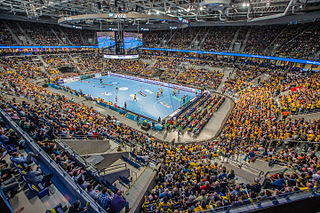
Handball is a team sport in which two teams of seven players each pass a ball using their hands with the aim of throwing it into the goal of the opposing team. A standard match consists of two periods of 30 minutes, and the team that scores more goals wins.
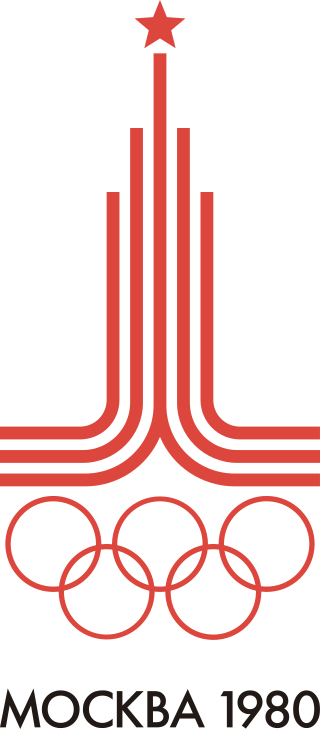
The 1980 Summer Olympics, officially known as the Games of the XXII Olympiad and officially branded as Moscow 1980, were an international multi-sport event held from 19 July to 3 August 1980 in Moscow, Soviet Union, in present-day Russia. The games were the first to be staged in an Eastern Bloc country, as well as the first Olympic Games and only Summer Olympics to be held in a Slavic language-speaking country. They were also the only Summer Olympic Games to be held in a self-proclaimed communist country until the 2008 Summer Olympics held in China. These were the final Olympic Games under the IOC Presidency of Michael Morris, 3rd Baron Killanin before he was succeeded by Juan Antonio Samaranch shortly afterward.
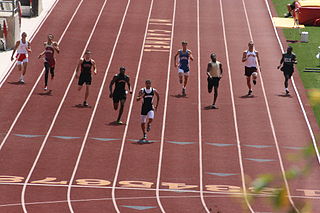
The 400 metres, or 400-meter dash, is a sprint event in track and field competitions. It has been featured in the athletics programme at the Summer Olympics since 1896 for men and since 1964 for women. On a standard outdoor running track, it is one lap around the track. Runners start in staggered positions and race in separate lanes for the entire course. In many countries, athletes previously competed in the 440-yard dash (402.336 m)—which is a quarter of a mile and was referred to as the "quarter-mile"—instead of the 400 m (437.445 yards), though this distance is now obsolete.

Swimming has been a sport at every modern Summer Olympics. It has been open to women since 1912. At the Olympics, swimming has the second-highest number of medal-contested events after athletics.

Australia was represented at the 2002 Commonwealth Games by a team selected by the Australian Commonwealth Games Association (ACGA) and abbreviated AUS.

Shooting sports have been included at every Summer Olympic Games since the birth of the modern Olympic movement at the 1896 Summer Olympics except at the 1904 and 1928 games.

The 1500 metres or 1,500-metre run is the foremost middle distance track event in athletics. The distance has been contested at the Summer Olympics since 1896 and the World Championships in Athletics since 1983. It is equivalent to 1.5 kilometers or approximately 15⁄16 miles. The event is closely associated with its slightly longer cousin, the mile race, from which it derives its nickname "the metric mile".
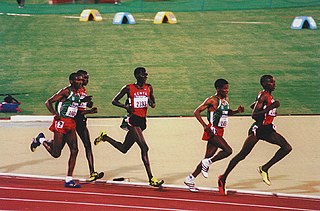
The 10,000 metres or the 10,000-metre run is a common long-distance track running event. The event is part of the athletics programme at the Olympic Games and the World Athletics Championships, and is common at championship-level events. The race consists of 25 laps around an Olympic-sized 400 m track. It is less commonly held at track and field meetings due to its duration. The 10,000-metre track race is usually distinguished from its road running counterpart, the 10K run, by referring to the distance in metres rather than kilometres.

Saint Kitts and Nevis first participated at the Olympic Games in 1996, and have competed in every Summer Olympic Games since then. The country has not competed at the Winter Olympic Games.

Djibouti first participated at the Olympic Games in 1984, and have competed in every Summer Olympic Games, apart from the 2004 edition, since then. They have never competed in the Winter Olympic Games.
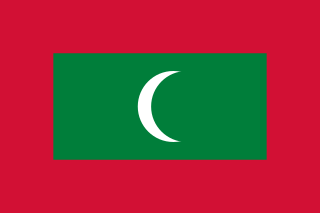
The Maldives first participated at the Olympic Games in 1988. It has sent athletes to compete in every Summer Olympic Games since, but has not participated in the Winter Olympic Games.

Katerine Savard is a Canadian competitive swimmer who specializes in women's butterfly events and freestyle relay. She holds several Canadian national records in the butterfly over the 50-, 100-, and 200-metre distances in both the short and long courses. Savard also holds the Canadian junior butterfly record in the 200-metre event. She won the gold medal at the 100-metre butterfly event at the 2013 Summer Universiade, held in Kazan. Savard also won gold at the 2014 Commonwealth Games in the 100-metre butterfly in Glasgow, where she set the Commonwealth record in the process. At the same games, she won a bronze medal as a member of the women's 4×100-metre medley relay team.

The 100 metres at the Summer Olympics has been contested since the first edition of the multi-sport event. The men's 100 metres has been present on the Olympic athletics programme since 1896. The 100 metres is considered one of the blue ribbon events of the Olympics and is among the highest profile competitions at the games. It is the most prestigious 100 metres race at an elite level and is the shortest sprinting competition at the Olympics – a position it has held at every edition except for a brief period between 1900 and 1904, when a men's 60 metres was contested.

Emma Jennifer McKeon, is a retired Australian competitive swimmer. She is an eight-time world record holder, three current and five former, in relays. Her total career haul of 14 Olympic medals following the 2024 Olympic Games made her the most decorated Australian, the third-most decorated swimmer, and the seventh-most decorated athlete in Olympic history and included one gold medal from the 2016 Summer Olympics in Rio de Janeiro, four gold medals from the 2020 Summer Olympics in Tokyo and one gold medal from the 2024 Summer Olympics in Paris. With four gold and three bronze medals she was the most decorated athlete across all sports at the 2020 Summer Olympics, and tied for the most medals won by a woman in a single Olympic Games. She also won 20 medals, including five gold medals, at the World Aquatics Championships; and a record 20 medals, including 14 gold, at the Commonwealth Games.

Caitlin Regal is a New Zealand canoeist. On 3 August 2021 she won a gold medal alongside Lisa Carrington in the K-2 500 metres event.

Shooting competitions at the 2018 Commonwealth Games in Gold Coast, Australia were held from 8 to 14 April at the Belmont Shooting Centre, Brisbane.
Swimming at the 2019 World Aquatics Championships was held from 21 to 28 July 2019.
Athletics was one of the 26 sports contested at the 2019 Pacific Games hosted by Samoa. The track and field events were held at Apia Park on 15–20 July, with the half marathon staged on a course at the Apia waterfront on 20 July. Forty-nine athletics events were contested at the games, including six parasport events.
















